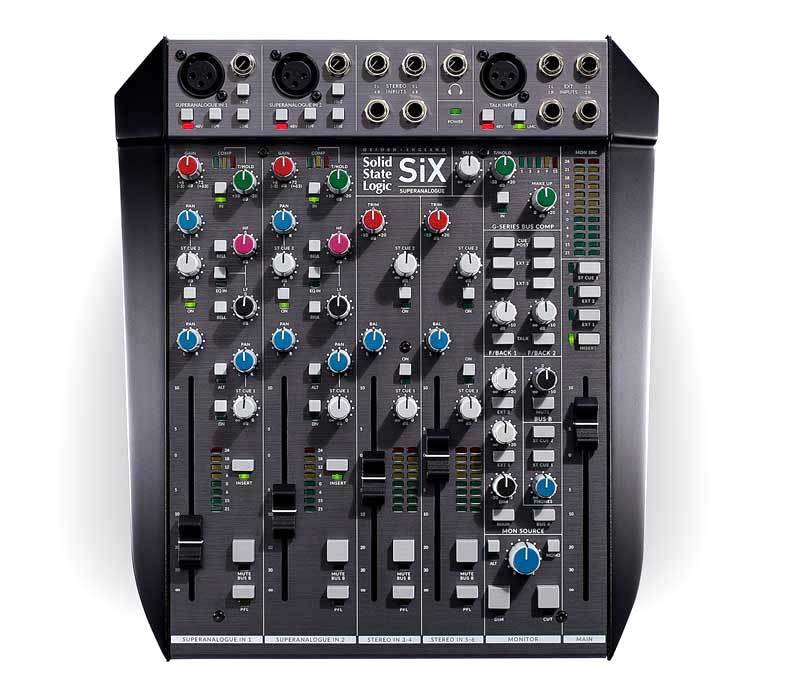- in Gear , Hardware , New Music Gear Monday , Production by Bobby Owsinski
New Music Gear Monday: SSL SiX Desktop Mixer

When Greg Mackie started the desktop mixer trend in 1991 with his ground-breaking CR-1604, it became quickly apparent that there was a real need for a high-quality, yet inexpensive small mixer. Unfortunately, the 1604 might have been the high-water mark for fidelity in the category way back then, as subsequent products have grown smaller, cheaper and more feature laden while sacrificing the audio quality in the process. That trend might now be changed with the introduction of the new SSL SiX desktop mixer.
SSL certainly knows how to build large format consoles, so you’d think that it would be a piece of cake to whip off a smaller version. That doesn’t look to be the case though, as the little powerhouse appears to have much thought put into it, and it’s that extra brainpower (besides the brand name) that clearly separates SiX from the rest of the field.
The SiX has two mono channels containing its trademarked SuperAnalogue mic pres that have up to 66dB of gain, which is quite a bit more than what you’ll typically find on mixers with a similar footprint. Each input also has phantom power, a 75Hz high pass filter, and an independent line-level input which can be switched to instrument level input with high impedance for instrument DI.
There’s a lot more though. Each channel also has a brand-new one knob compressor that the company claims has the same sound as the classic SSL feed-forward channel compressor circuit found in its larger consoles. This compressor has a program-dependent attack time, a fixed release time and fixed ratio, and auto-gain so it’s a snap to set up.
There’s also a new two-band EQ that can be independently switched between shelf and bell curves, with different center frequencies for each. I haven’t been able to find out exactly what these center frequencies are, but the company says that it spent a good amount of time determining what the most usable and musical points were. With a company so steeped in history of creating gear that makes hits, I think I’ll trust them on this one.
Each channel has a fully balanced insert point for integrating other signal processors ,which is after the EQ and compressor circuits. It’s always active so that you can use this as a dry record send to your DAW if required.
There are two stereo channels along with the 2 monos, and all channels have a full 100mm fader (as does the master). There are also two stereo cue sends per channel, with the mono channels also having a pan control. Each channel also has a Mute and PFL switch, and the Mute also routes to a separate Bus B output, complete with a level control and mute.
The master section is pretty cool as well. First of all, there’s a two-control version of the famous SSL Buss Compressor that’s built around a more modern quad-VCA chip but with a fixed ratio, attack, and release settings. Then there’s extensive routing to the master outputs (up to 12 channels if you use the external inputs) and Cue buss, plus a monitor section that features Mono, DIM, Cut and ALT controls.
To top it all off, there’s also a talkback mic input with phantom power that features SSL’s unique Listen Mic Compressor, which was the unique processor used for that 1980’s “Phil Collins sound.”
Best of all, the SiX looks like it’s an SSL, with the same knobs and feel. I’m actually surprised that it’s only $1,499 considering what’s included.
If you’re looking for a small high-quality desktop mixer and can’t settle for one of the many cheapies on the market, this is certainly worth checking out.
You can find out more info on SSL’s dedicated page, or in the video below.
Sorry, but comments have been disabled due to the enormous amount of spam received. Please leave a comment on the social media post related to this topic instead.

